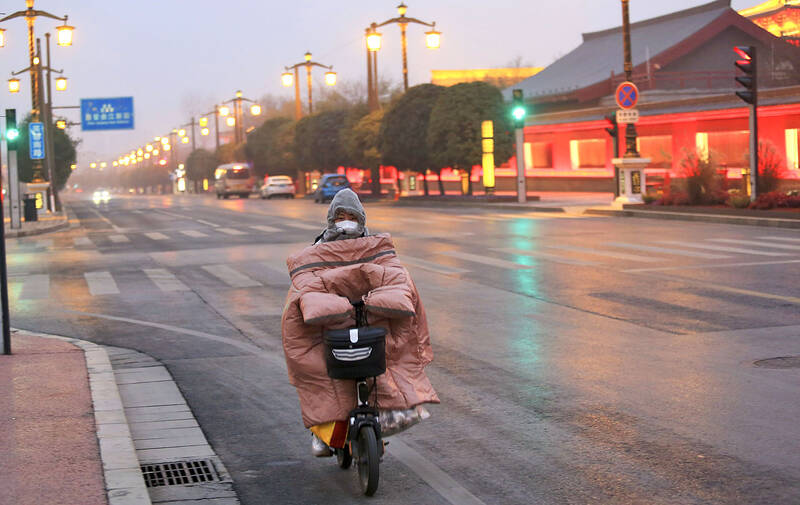China has locked down parts of central Xian, confining some of the city’s 13 million people to their homes for at least one week, and other major hubs are rolling out restrictions in a reinforcement of the country’s commitment to “zero COVID.”
While the entire city has not been shut down, some areas are being “managed” according to rules that apply to neighborhoods in China deemed to be of high or medium risk for COVID-19, according to a local media report posted on the Xian government’s official WeChat account late on Thursday.
The city had 57 high-risk areas as of Thursday, and 74 medium-risk, a separate post showed.

Photo: AP
Residents in high-risk areas need to stay at home until no new COVID-19 infections are reported for seven days and the areas are downgraded to medium risk, the Chinese National Health Commission said.
People living in medium-risk areas are restricted to movement within those neighborhoods until no new infections are reported over a seven-day period. Xian posted 37 local infections for Thursday, up from 34 the day before.
Elsewhere, Foxconn Technology Group (富士康科技集團) imposed curbs in its main iPhone assembly campus in Zhengzhou, and more Shanghai residents are facing restrictions.
The curbs come even as officials at the national level debate whether to reduce the amount of time people coming into the country must spend in mandatory quarantine.
Chinese President Xi Jinping (習近平) on Sunday signaled no change to the “zero COVID” approach, disappointing investors who had hoped for some signs of loosening. During a speech opening the Chinese Communist Party congress in Beijing, Xi said the rules protect people’s lives, although he did not mention the economic toll.
Shanghai, which posted 13 local infections on Thursday, stepped up virus curbs while the party congress is occurring. A growing number of apartments and residential compounds have been locked down due to positive cases.
In Henan Province, Foxconn shut cafeterias at its Zhengzhou plant, asked workers to eat in their dorm rooms and requires workers to wear secure N95 masks. The company also imposed restrictions on staff movement, closing some entrances while mandating employees commute to plants only on certain routes.
The city reported 15 new cases and has locked down one of its most-populated districts.
In the neighboring province of Anhui, Hefei reported eight new cases and shut indoor facilities including cinemas, gyms and bars to curb the spread of COVID-19, a statement from the municipal government said.
While China’s most important cities have so far avoided large-scale shutdowns, the creeping restrictions underscore a constant threat of disruption to daily life.
Rumors about a city-wide lockdown in Xian began on Thursday afternoon, leading to residents panic-buying groceries and emptying shelves in supermarkets, social media posts showed.
China reported 783 infections on Thursday, with cases holding well below a peak of nearly 2,000 earlier this month.

EUROPEAN TARGETS: The planned Munich center would support TSMC’s European customers to design high-performance, energy-efficient chips, an executive said Taiwan Semiconductor Manufacturing Co (TSMC, 台積電), the world’s largest contract chipmaker, yesterday said that it plans to launch a new research-and-development (R&D) center in Munich, Germany, next quarter to assist customers with chip design. TSMC Europe president Paul de Bot made the announcement during a technology symposium in Amsterdam on Tuesday, the chipmaker said. The new Munich center would be the firm’s first chip designing center in Europe, it said. The chipmaker has set up a major R&D center at its base of operations in Hsinchu and plans to create a new one in the US to provide services for major US customers,

BEIJING’S ‘PAWN’: ‘We, as Chinese, should never forget our roots, history, culture,’ Want Want Holdings general manager Tsai Wang-ting said at a summit in China The Mainland Affairs Council (MAC) yesterday condemned Want Want China Times Media Group (旺旺中時媒體集團) for making comments at the Cross-Strait Chinese Culture Summit that it said have damaged Taiwan’s sovereignty, adding that it would investigate if the group had colluded with China in the matter and contravened cross-strait regulations. The council issued a statement after Want Want Holdings (旺旺集團有限公司) general manager Tsai Wang-ting (蔡旺庭), the third son of the group’s founder, Tsai Eng-meng (蔡衍明), said at the summit last week that the group originated in “Chinese Taiwan,” and has developed and prospered in “the motherland.” “We, as Chinese, should never

‘ABUSE OF POWER’: Lee Chun-yi allegedly used a Control Yuan vehicle to transport his dog to a pet grooming salon and take his wife to restaurants, media reports said Control Yuan Secretary-General Lee Chun-yi (李俊俋) resigned on Sunday night, admitting that he had misused a government vehicle, as reported by the media. Control Yuan Vice President Lee Hung-chun (李鴻鈞) yesterday apologized to the public over the issue. The watchdog body would follow up on similar accusations made by the Chinese Nationalist Party (KMT) and would investigate the alleged misuse of government vehicles by three other Control Yuan members: Su Li-chiung (蘇麗瓊), Lin Yu-jung (林郁容) and Wang Jung-chang (王榮璋), Lee Hung-chun said. Lee Chun-yi in a statement apologized for using a Control Yuan vehicle to transport his dog to a

‘A SURVIVAL QUESTION’: US officials have been urging the opposition KMT and TPP not to block defense spending, especially the special defense budget, an official said The US plans to ramp up weapons sales to Taiwan to a level exceeding US President Donald Trump’s first term as part of an effort to deter China as it intensifies military pressure on the nation, two US officials said on condition of anonymity. If US arms sales do accelerate, it could ease worries about the extent of Trump’s commitment to Taiwan. It would also add new friction to the tense US-China relationship. The officials said they expect US approvals for weapons sales to Taiwan over the next four years to surpass those in Trump’s first term, with one of them saying